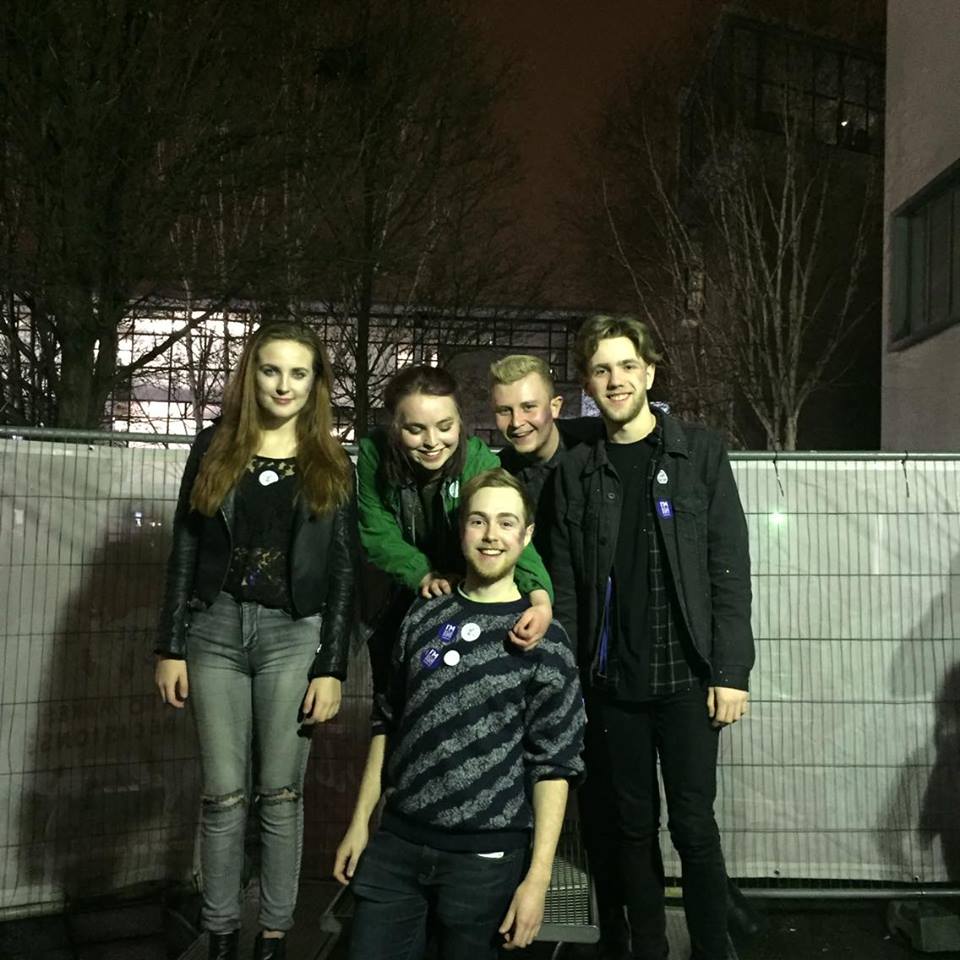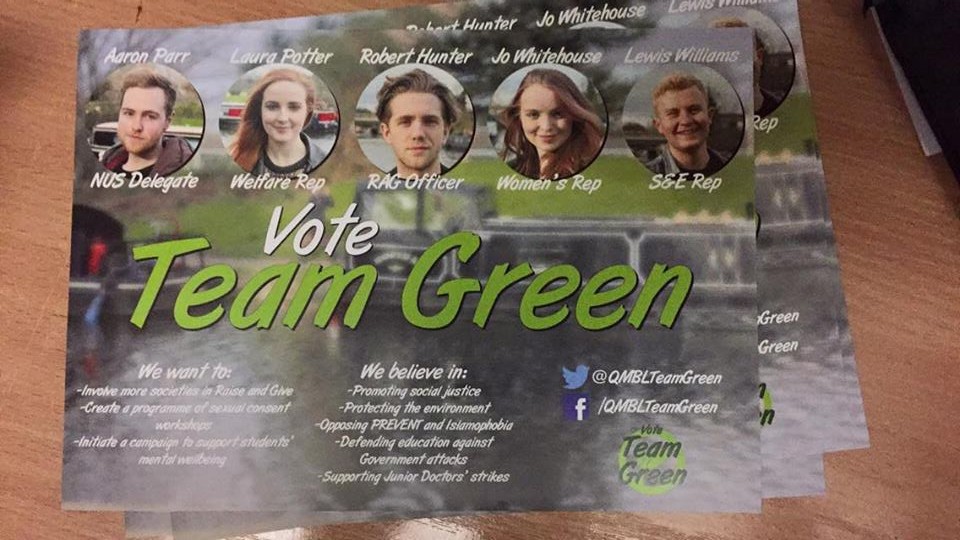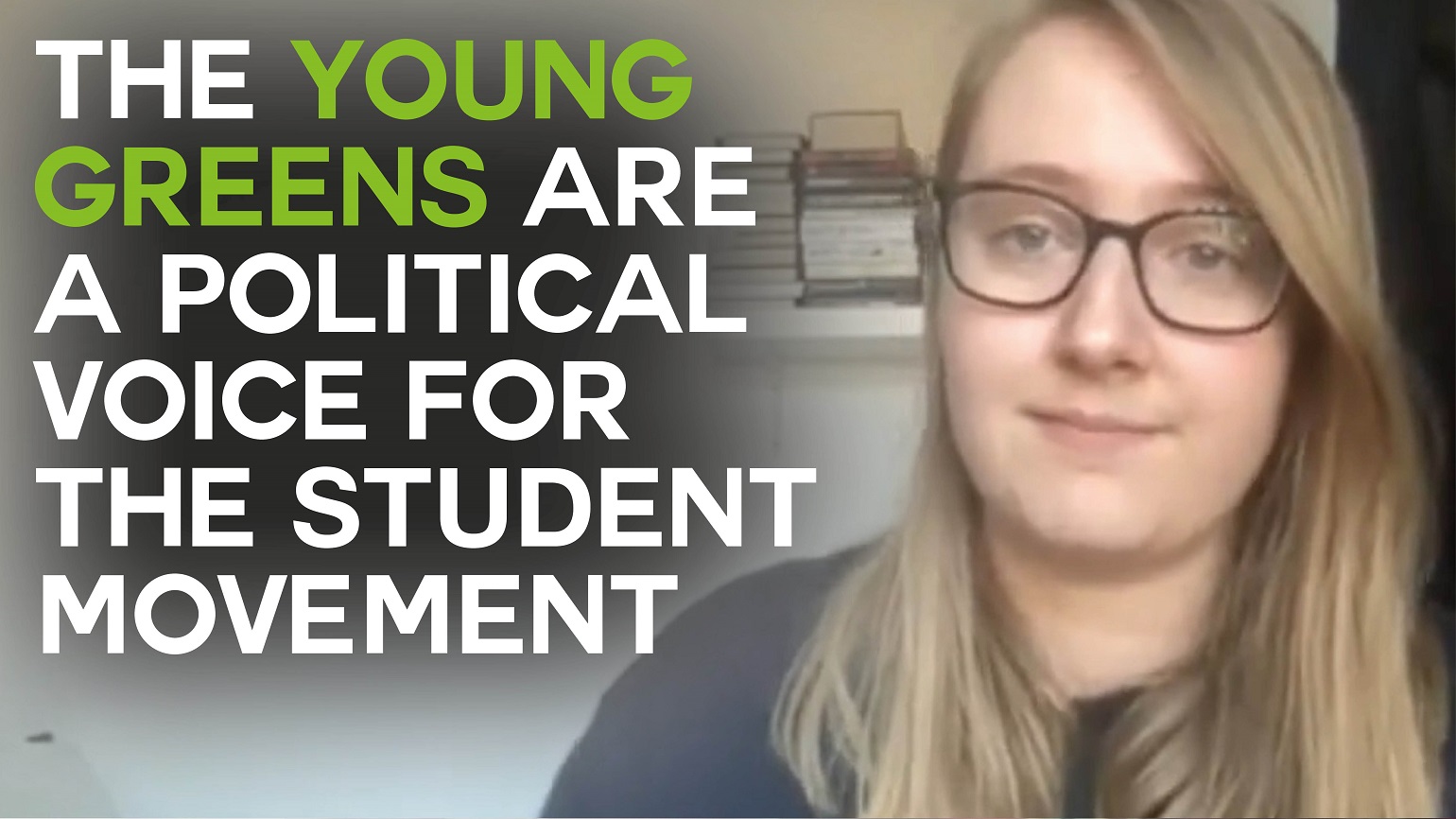Interview: is this the Greenest university in the UK?

With a ridiculously low turnout of just 43% of 18-24 year olds in the General Election, it can be a challenge to interest young people in politics and many university and local Young Greens groups have struggled to get off of the ground and remain active. One university group has defied this trend.
Queen Mary’s Young Green society has an impressive resume: it was recently announced that they had topped the Queen Mary society Raise and Give leaderboards, more than doubling their closest competitors to raise £8,334 for charity and winning Best Fundraising Group of the year; they received a Highly Commended award at the Student Union’s society of the year awards; and perhaps more importantly, they managed to run a totally successful slate of five candidates in their SU elections, turning their popularity into influence in the same way that the Green Party can only hope to convert their viral election video into votes.
But what the society have affectionately dubbed as “Green Mary” doesn’t seem to have been a recent phenomenon. The 2014 Union President, Oyedola Osilaja, has confirmed that he was a Green Party supporter during his term, the 2015 – 2016 President, Carolina Mantzalos voted Green in the General Election and the President elect, Miranda Black, is even more enthusiastic about the Greens.
Carolina said “The Young Greens have worked incredibly hard to embrace the student community at QMUL and have successfully organised incredible events to raise money for causes that truly impact our student body! They’ve been great at engaging our community! I support the Greens because they are about bringing the power back to the community and the people. They are the party that engage people into how our world affects us and put us at the forefront for change!” Miranda Black intends to join the Young Greens society because “they’re fab and do loads for charity”, bringing Green representation up to an impressive six elected officers.
I caught up with two of the society’s members to discuss the recent success: Aaron Parr, who was elected as Queen Mary’s NUS delegate, and Robert Hunter, the new Raise and Give officer and President of Queen Mary Young Greens.
I noticed that in your recent Student Union elections, the majority of the voters were Freshers; do you think the novelty of voting wears off as students progress through university or is there a loss of interest in student politics?
Aaron Parr: I think it normally is quite a lot of freshers who vote in our elections anyway, because we have an actual campus, and most of the universities in London don’t have campuses, so they always see a lot of advertising, they get a lot of flyers and people walking past – and also a lot of people flyer the houses as well. But I do also think interesting to them because they are fresh to campus and want to get involved as much as they can, and they have time to actually look through all of the manifestos.
Robert Hunter: I think that the novelty can definitely wear off for some students, and third or fourth years especially may feel apathetic because they won’t be affected by the actions of the next year’s union. Also, the hustings turnouts seem to be limited in the most part to candidates and their friends.
How do you think more people can become engaged in student politics?
AP: When it comes to student politics, I think it’s best to go through societies and get societies involved. On our campus there’s a bit of debate around society endorsements, but I think they’re actually a really good thing and should be encouraged rather than dismissed – simply because then, if every society – even small ones – aren’t left out then people will be participating and get more engaged and hear about it, and hopefully then understand how the student union is responsible for things like the student bar, and how they are the ones who have extended the library’s hours.
RH: Actively engaging students that aren’t interested is a difficult task as they could become easily annoyed and even less interested. Currently the main form of advertisement is through email and an advert on the underused QMSU website. Although passive, I think greater engagement could be achieved by advertising the elections in other places, such as QMPlus. I think more could be done by candidates too. Only a few really passionate candidates took a lot of time out to engage with students, and I am certain that this won them lots of individual votes.
How did you personally become interested in student politics?
RH: I have been interested in student politics since I was in sixth form. The decisions that are made by bodies such as the Student Council affect me, and they are a very important way for students’ to get their voice heard. I was the Head Boy of my Sixth Form last year, and coming to university I really wanted to stay involved with student politics.
AP: Well, when I first went to university I didn’t know anything about politics, didn’t even know what left wing and right wing was. And then I didn’t do anything in Fresher’s week, and suddenly the excitement was over, and I wanted to do something. The only thing left to do was to run for the SU, for the first year representative, and I thought “whatever, let’s just do it”. I threw myself in the deep end and ran for it – I got all of my friends to come and campaign with me, we went out to the student bar in Vote Parr t-shirts… and I won by the skin of my teeth. I got to know people through the student union and I ran again the next time, stuck to it and became involved.
Would you say Queen Mary’s is a pretty progressive campus?
RH: Yes, definitely! There is a massive amount of diversity on this campus and with that comes an inherent level of respect for other people’s beliefs and cultures. Two of the biggest societies are the Young Greens and Labour, which I think definitely shows the amount of engagement with progressive politics.
AP: Queen Mary’s isn’t really known for its radical activism as much as SOAS, UCL, or Goldsmiths. But I think there’s room for it, and we just need to be a bit more united on fronts that we all agree on, and get our voices heard a bit more; because at the moment it’s lots of separate groups, especially because there’s a large Muslim population on campus that are often a bit excluded from our political actions, so it would be great to get them more involved.
Lots of people criticise bringing political parties into student politics – what do you think about that?
AP: I think what we tried to do was bring Green ideology rather than Green Party to the student union, because we’ve had a bit of trouble trying to get the uni engaged with green politics and environmentalism and stuff. We’ve often brought motions to council and they’ve been rejected because of nitpicking and stuff when it was actually really important, so we thought – let’s go with a platform of environmental and social justice! That’s what we were campaigning with and it seems to be really engaging people. It’s not like we were the Green Party candidates. We were Team Green, we were running under Green ideology.
RH: I can understand why people would criticise it, but I don’t think us being Team Green was being pushy of our political beliefs but rather us being united in similar principles that we feel could be very beneficial to our student union.
So, the Green Party ethos rather than the Green Party itself?
AP: Yeah, definitely.
Do you think the success was because you were Green or despite it?
AP: I feel like it was helpful, because our society has done quite a lot on campus – we’ve met a lot of people through events – we’ve done anti racism events, we’ve done mental health events and we’ve also done club nights and stuff like that, so people know us through the Young Greens, and we all met through the Young Greens. So when people said “oh, you’re not going to win because you’re running under Green” and they thought it would be a deterrent, I really don’t think it was. Though admittedly, I’m not sure how much of an advantage it was. I’d like to think that a lot of people would think “oh, Green, I’d like to get on board with that.” Actually, when I was campaigning, a lot of people did say “I just voted for everyone with Green next to their name because I’m doing environmental science.”
RH: There were other reasons we were successful too, I think a lot of it was down to us being such good friends. We share common ideas, and know how to work well together and I think in our campaigning we managed to get this across. We also tried to engage a lot of students ourselves, which is very important. So overall, I don’t think our success was necessarily because or despite the fact that we are Green but rather down to a number of reasons.
Was it a fluke? Do you think you’ve made a lasting left wing impact on campus, and if not are you hoping to?
AP: I think the left leaning of the campus helped, but I don’t think it was a fluke at all because we worked really hard on our manifestos, we did have great policies, we had a broad range of policies and people saw that we worked together. We weren’t putting a lot of negative things out on Twitter like lots of other groups were. We weren’t all well known within student politics but we made ourselves known at hustings and stuff – oh no, what was the question again?
<laughs> Was it a fluke or was it the left wing campus?
AP: Okay, so no it wasn’t a fluke for us but I think the left leaning campus helped.
RH: I don’t think our win was a fluke at all, we all worked really hard to get ourselves out there in different ways and engage with students. A lot of things that we believe in and we want to do are things that I think this student body really want to get behind.
Are you going to try and engage with other left wing groups on campus within your roles?
AP: I personally can’t do much as NUS delegate but I’d like to see a more progressive SU set up. At the moment we have a separate society called Left Forum that tries to engage lots of different groups, but it’s not as successful because they’re all separate groups. I think there needs to be an umbrella forum that brings together all the groups that share core principles. So for example, things like free education: the group could reach out to the separate groups and arrange a protest, something like that.
RH: In my role I will be trying to engage with as many groups as I can, and naturally this includes other left wing groups. The Young Greens and Disco Soc (the two groups that have fundraised the most this year) have shown how much can be done when societies are involved with fundraising and this something I want to grow next year. I feel that left-leaning societies are more likely to be involved with charitable causes but I want to work with as many societies as possible to really promote RAG over the next year.

Would you recommend other uni groups run a slate under the green banner, or would it be best to run a slate of Greens without stating the political affiliations?
AP: I think it depends on how big the societies are, and how well they’re known. If they’ve only got a couple of members then it’s really best to develop the society – but also it’s up to them! If they want to do it, then go for it. We only really did it because we thought it would be fun and raise awareness for green ideology and maybe we’d have a couple of people win – but in the end we all won!
RH: Our slate was made up of dedicated Greens, and we all felt strongly about Green ideas. It seemed natural for us to run under a slate because it showed the views we all held. If this is the case in another uni, I would definitely recommend them to run under a Green slate. We have shown that it can definitely work!
Aaron, as NUS delegate – the NUS has recently been criticised for being “too political” and too involved in mainstream party politics. What would you say to that, do you think there’s such thing as too political?
AP: Well, the NUS hasn’t really done enough to really have a progressive agenda in politics, they’ve really just sat on the sidelines a bit. While half of the NUS leadership are trying to do progressive things, the other half are really holding back. That’s the problem. I think they’re definitely not being radical enough.
And Robert, do you have any new fundraising ideas you’re hoping to put into place?
RH: I have a lot of ideas for the next year, and this mainly focuses around two things. First of all I want to increase society engagement in RAG. I believe that societies are the perfect way to raise money and get more people involved. With support from the RAG team, societies could host their own events, much like the Young Greens have done this year. I also want to make sure that RAG events are promoted better, so that as many students are reached as possible. As for specific events, there is much planning to be done! However, I want the university themselves to be involved with a number of ideas, such as a library fine amnesty (where for one day, any library fines paid go to RAG).
There’s been some conflict at other universities regarding cultural appropriation at RAG events, for example “colour runs” involving throwing powder paint culturally appropriating the festival Holi. Do you have any plans to prevent this kind of thing happening at Queen Mary’s?
RH: This can be quite a difficult topic to approach, however I feel that it is of the utmost importance that people’s cultures are respected. I think that celebrating the diversity of our campus is a really exciting prospect, but we have to ensure that all events run for RAG are inclusive and respectful. I think the best way to go about this is by working with different groups within the university on different events. I want to be able to act as a platform for groups to run the events that they want to. However, I feel that the RAG team and student body as a whole have a responsibility to act in a way that does not disrespect or appropriate others cultures for their own gain.
Follow QM Young Greens on Twitter: @QMGreens




Leave a Reply